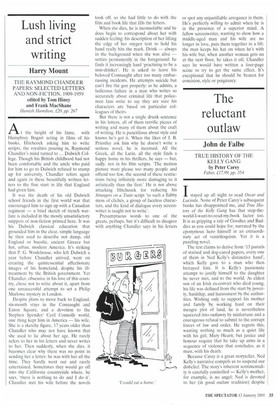Lush living and strict writing
Harry Mount
THE RAYMOND CHANDLER PAPERS: SELECTED LETTERS AND NON-FICTION, 1909-1959 edited by Tom Hiney and Frank MacShane Mulish Hamilton, 120, pp. 267 t the height of his fame, with Humphrey Bogart acting in films of his books, Hitchcock asking him to write scripts, the royalties pouring in, Raymond Chandler's mind turned to ... Dulwich College, Though his British childhood had not been comfortable and the uncle who paid for him to go to Dulwich refused to stump up for university, Chandler refers again and again in these beautifully written letters to the fine start in life that England had given him.
It was the death of his old Dulwich school friends in the first world war that encouraged him to sign up with a Canadian regiment — a brief sketch of trench warfare is included in the mostly unsatisfactory snippets of non-fiction printed here. It was his Dulwich classical education that grounded him in the clear, simple language he then used to describe not damp, old England or bucolic, ancient Greece but hot, urban, modern America. It's striking that P. G. Woclehouse, who left Dulwich a year before Chandler arrived, went on creating the quintessential affectionate images of his homeland, despite his illtreatment by the British government. Yet Chandler, obsessive in his love of this country, chose not to write about it, apart from one unsuccessful attempt to set a Philip Marlowe mystery in London.
Despite plans to move back to England, six-month stays in the Connaught and Eaton Square, and a devotion to the Stephen Spender/ Cyril Connolly world, one thing kept him in America — his wife. She is a sketchy figure, 17 years older than Chandler who may not have known that she used to lie about her age. He rarely refers to her in his letters and never writes to her. Then suddenly, when she dies, it becomes clear why there was no point in sending her a letter: he was with her all the time. They hardly went out and rarely entertained. Sometimes they would go off into the California countryside where, he says, 'there is nothing to do and I do it'. Chandler met his wife before the novels took off, so she had little to do with the film and book life that fills the letters.
When she dies, he is inconsolable and he does begin to correspond about her with sudden feeling: his description of her lifting the edge of her oxygen tent to hold his hand really hits the mark. Drink — always in the background when she was alive — settles permanently in the foreground: he finds it increasingly hard 'practising to be a non-drinker'. He is asked to leave his beloved Connaught after too many embarrassing incidents. He attempts suicide but can't fire the gun properly: as he admits, a ludicrous failure in a man who writes so accurately about criminal life that policemen fans write to say they are sure his characters are based on particular colleagues of theirs.
But there is not a single drunk sentence in his letters, all of them terrific pieces of writing and many of them about the craft of writing. He is punctilious about style and knows he's got it. When the likes of I. B. Priestley ask him why he doesn't write a serious novel, he is incensed. All the Greek, all the Latin, all the style finds a happy home in his thrillers, he says — but, sadly, not in his film scripts. 'The motion picture must please too many people and offend too few, the second of these restrictions being infinitely more damaging to it artistically than the first.' He is not above attacking Hitchcock for reducing his Strangers on a Train script 'to such a flabby mess of clichés, a group of faceless characters, and the kind of dialogue every screenwriter is taught not to write'.
Presumptuous words to one of the greats, perhaps, but it's difficult to disagree with anything Chandler says in his letters or spot any unjustifiable arrogance in them. He's perfectly willing to admit when he is in the presence of a superior mind. A fellow screenwriter, wanting to show how a middle-aged man and his wife are no longer in love, puts them together in a lift: the man keeps his hat on when he's with his wife but, when another woman gets on at the next floor, he takes it off. Chandler says he would have written a four-page scene to try to get the same effect. It's exceptional that he should be beaten for concision, style or poignancy.






























































 Previous page
Previous page